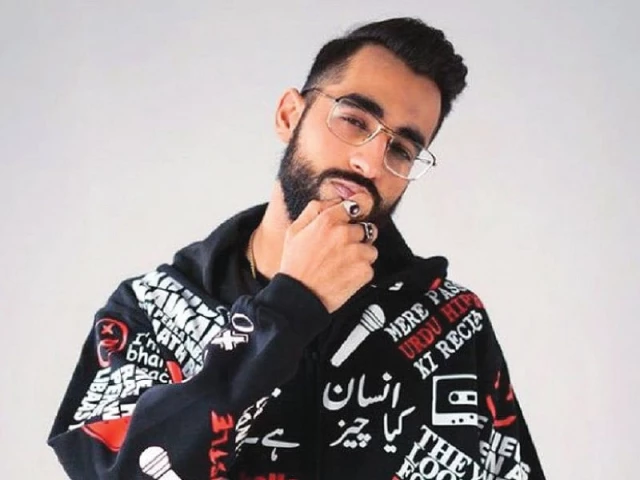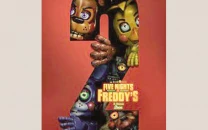No shikwa with Talhah Yunus so far
Rapper brings solo album with smoke in its lungs and fire in its belly

Guess who's back? That's right, it's Young Stunners' Talhah Yunus with an album of Iqbal-esque complaints, and let's just say, I'm bopping my head even as I write this. There's something delightfully cinematic about Shikwa (Side A), Talhah Yunus' long-awaited solo album dropped on Friday; a collection of ten tracks which feels like a smouldering monologue delivered under a flickering street lamp in Karachi, cigarette burning, pistol on the table. It's noir rap. It's desi existentialism in an expensive leather jacket. And it's Yunus' most compelling declaration of self yet.
The album opens not with an invitation but a warning. Gangsters slink in with Wazir Patar's rusty-slick Punjabi verse and Rap Demon's biting delivery. The beat is dark, oily, and Yunus doesn't rap so much as stalk through the track, delivering bars like he's loading bullets. It's a swaggering setup and a clever misdirection. Because just when you expect an album full of smoke and fire, Yunus pivots toward something far more emotionally layered.
Musically, Shikwa (Side A) walks a fine line between drill-inspired aggression and melancholic reflection. The mixing is clean but not sterile: basslines thump without overpowering, and the beats across tracks show a careful commitment to restraint. You don't get the hyper-saturated maximalism of commercial hip-hop here. Instead, producers Umair and Jokhay curate a moodboard of icy synths, ambient textures, and pocketed drums that allow space for Yunus' voice: low, steady, often more pained than proud.
Somewhere between Takeover and Fancy, the persona of "Talhah Yunus" starts to fracture. Yes, he flexes with his signature iced-out confidence, nods to influence, lyrical stunt work. But listen closer, and Yunus keeps doubling back, questioning the very world he's painting gold. The writing is introspective, often self-critical. Nowhere is this clearer than in Shopping, where a bouncy, almost pop-like beat camouflages a growing cynicism. Karachi is my home and my warzone, it spits, flipping the consumerist thrill into something that feels more like survival.
Talk to him, he talks back
Guess Who's Back drops like a villain re-entering halfway through the story. But this isn't just a triumphant return. Yunus isn't hungry for the charts; he's clawing back a sense of self. There's a studied layering here: each verse glances back at his past work but refuses to get nostalgic. This is not the Young Stunners of Burger-e-Karachi, this is a more bruised, more bitter narrator trying to find coherence in contradiction.
And the collaborations aren't just for show. Dawgs with Talha Anjum sounds like a conversation between two old friends: coded, world-weary, intimate. The chemistry is still there, but it simmers rather than sparks. Then there's Happen, where Faris Shafi delivers razorwire poetry with all the weight of a confession booth. Yunus meets him in that vulnerability, and together they flip the beat into a space of disorientation and regret. Happen is a moment of emotional disarmament in an otherwise controlled album.
The sonic palette shifts in interesting ways, too. 100% injects Shareh's laid-back delivery into a beat that leans more lo-fi than trap. It's a palette cleanser, chai on a hot day, while Majaal, with Shamoon Ismail's honeyed hook, is almost airborne in its smoothness. These tracks are tonal contrast, and Yunus uses them smartly, punctuating the record with moments of lightness that never drift into frivolity.
And then there's Shikwa, the closer and the namesake. It's the album's anchor, a track that sounds like a sigh turned into song. Layered with Urdu poetry, the verse, "Kya hi shikwa karein phir, teri ghalti nahi hai," lands like a heart quietly breaking. The production drops out just enough to let the emotion breathe. It's the kind of track you sit with long after it ends.
Deconstructing a heartbreak
What's especially clever is how Shikwa (Side A) retroactively speaks to Shikwa (Side B), released last year in a chronology-flipping move. Side B was all heartbreak and smoke; a post-mortem on love and loss. Side A is the build-up, the swagger, the denial, the grand illusions before the crash. If Side B was the aftermath, Side A is the ego's final stand. Taken together, they form a nonlinear heartbreak, a rap duology that says: here's what went wrong, and here's who I was before I knew it had.
Ultimately, Shikwa (Side A) does what most solo rap debuts can't: it tells a story only Talhah Yunus could tell. There's plot, mood, character, and critique. There's wordplay and world-building. It's not perfect but it's deliberately imperfect, and that's what makes it honest.
Is it okay to ask for a Side C? If it happens, it had better bring tissues and a body bag. Because if this is just the beginning of the shikwa, we're not ready for the jawab.
Shikwa (Side A) is now out on YouTube and Spotify.
Have something to add to the story? Share it in the comment below.



















COMMENTS
Comments are moderated and generally will be posted if they are on-topic and not abusive.
For more information, please see our Comments FAQ